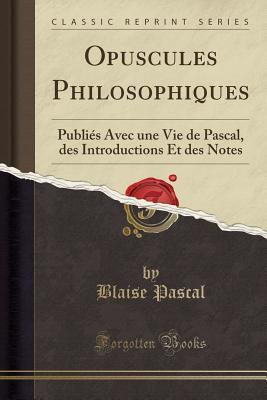- Bíblia
- Leia a Bíblia
- Versões da Bíblia
- Verso do dia
- Planos de Leitura
- Versos por Tópico
- Books of the Bible
- Imagens bíblicas
- Estude
- Comentários
- Concordâncias
- Dicionários
- Enciclopédias
- Sermões
- Bible Atlas & Maps
- BP Wiki
- Devocionais
- Devocionais de hoje
- Light of the World
- Todos os devocionais
- Inspirational Quotes
- Mais
- Picture Quotes
- Videos
- Inspirador
- Estudo da Bíblia
- O que a Bíblia diz
- Bible Q&As
- Daily Bread
- Bible by Genre
- Bible Stories
- Random Bible Verse
- Comunidade
- Store
Opuscules Philosophiques: Publi�s Avec une Vie de Pascal, des Introductions Et des Notes (Classic Reprint)
by Blaise Pascal
Excerpt from Opuscules Philosophiques: Publies Avec une Vie de Pascal, des Introductions Et des Notes
Pour les notes et remarques, le commentaire de M. Havet nous a beaucoup servi nous y avons ajoute plusieurs citations de philosophes du dix - septieme siecle, et ca et la quelques explications pour faire comprendre le role de Pascal comme savant et comme apologiste du christianisme. Ou peut con sulter avec interet sur cette double question deux recents ouvrages, l'un de M. Nourrisson, Pascal physicien et philosophe (perrin, l'autre de M. Edouard Droz, Etude sur le scepticisme de Pascal (alcan, Ou peut toujours relire aussi sur Pascal les pages brillantes de prevost-paradol dans ses Moralistes francais (hachette.
About the Publisher
Forgotten Books publishes hundreds of thousands of rare and classic books. Find more at www.forgottenbooks.comwww.forgottenbooks.com
This book is a reproduction of an important historical work. Forgotten Books uses state-of-the-art technology to digitally reconstruct the work, preserving the original format whilst repairing imperfections present in the aged copy. In rare cases, an imperfection in the original, such as a blemish or missing page, may be replicated in our edition. We do, however, repair the vast majority of imperfections successfully; any imperfections that remain are intentionally left to preserve the state of such historical works.
Pour les notes et remarques, le commentaire de M. Havet nous a beaucoup servi nous y avons ajoute plusieurs citations de philosophes du dix - septieme siecle, et ca et la quelques explications pour faire comprendre le role de Pascal comme savant et comme apologiste du christianisme. Ou peut con sulter avec interet sur cette double question deux recents ouvrages, l'un de M. Nourrisson, Pascal physicien et philosophe (perrin, l'autre de M. Edouard Droz, Etude sur le scepticisme de Pascal (alcan, Ou peut toujours relire aussi sur Pascal les pages brillantes de prevost-paradol dans ses Moralistes francais (hachette.
About the Publisher
Forgotten Books publishes hundreds of thousands of rare and classic books. Find more at www.forgottenbooks.comwww.forgottenbooks.com
This book is a reproduction of an important historical work. Forgotten Books uses state-of-the-art technology to digitally reconstruct the work, preserving the original format whilst repairing imperfections present in the aged copy. In rare cases, an imperfection in the original, such as a blemish or missing page, may be replicated in our edition. We do, however, repair the vast majority of imperfections successfully; any imperfections that remain are intentionally left to preserve the state of such historical works.
BUY NOW
Paperback, 180 pages
Published August 4th 2018 by Forgotten Books
Se inscrever
© 2025 Bibleportal.com Todos os direitos reservados.

Among the contemporaries of Descartes none displayed greater natural genius than Pascal, but his mathematical reputation rests more on what he might have done than on what he actually effected, as during a considerable part of his life he deemed it his duty to devote his whole time to religious exercises.
At 16, Pascal began designing a calculating machine, which he finally perfected when he was thirty, the pascaline, a beautiful handcrafted box about fourteen by five by three inches. The first accurate mechanical calculator was born.
Pascal was dismayed and disgusted by society's reactions to his machine and completely renounced his interest in science an mathematics, devoting the rest of his life to God. He is best known for his collection of spiritual essays, Les Pensees.
Ironically, Pascal, who was a genius by any measure, with one of the finest brains of all time, died of a brain hemorrhage at the age of 39.
Among the contemporaries of Descartes none displayed greater natural genius than Pascal, but his mathematical reputation rests more on what he might have done than on what he actually effected, as during a considerable part of his life he deemed it his duty to devote his whole time to religious exercises.
He was a child prodigy who was educated by his father, a Tax Collector in Rouen. Pascal's earliest work was in the natural and applied sciences where he made important contributions to the study of fluids, and clarified the concepts of pressure and vacuum by generalizing the work of Evangelista Torricelli.
In 1646, he and his sister Jacqueline identified with the religious movement within Catholicism known by its detractors as Jansenism. Following a mystical experience in late 1654, he had his "second conversion", abandoned his scientific work, and devoted himself to philosophy and theology. His two most famous works date from this period: the Lettres provinciales and the Pensees.
In honor of his scientific contributions, the name Pascal has been given to the SI unit of pressure, to a programming language, and Pascal's law (an important principle of hydrostatics), and as mentioned above, Pascal's triangle and Pascal's wager still bear his name.
... Show more